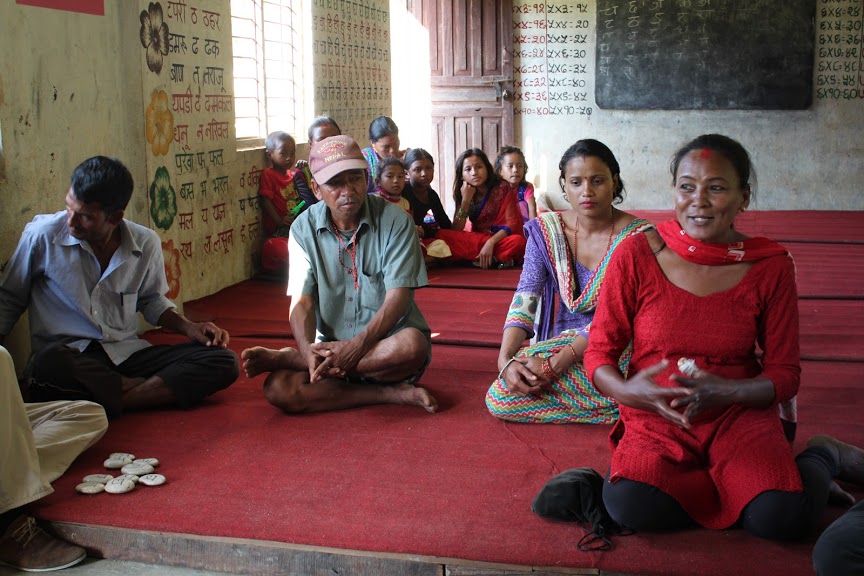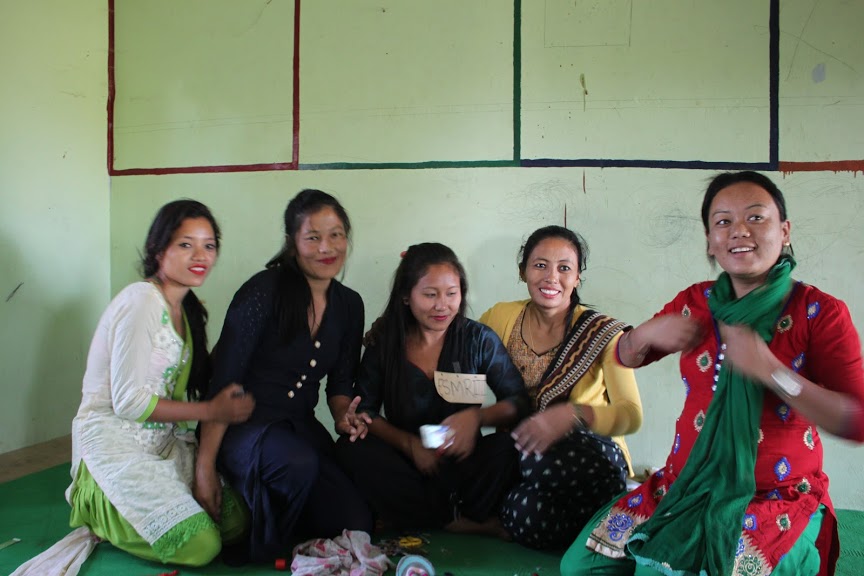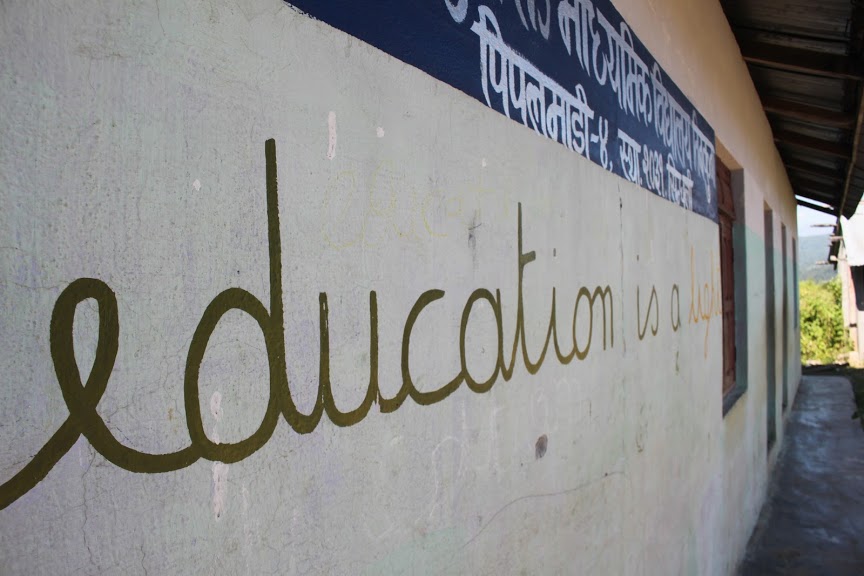January 2018
(Boys and girls, or is it girls and boys?)
About emancipation in the fieldwork of CEPP
CEPP, the Center for Educational Policies and Practices, wants to improve (free) state education in remote and disadvantaged villages, appreciate and motivate teachers, inform parents about the importance of education and about their rights, and influence (education) policy throughout Nepal. Their motto is 'Education is a Light' and they assume that education counteracts inequality. They supervise 33 schools in Inner Terai, the transition between the low plain in the south and the low mountain range, an area full of ethnic minorities that are often at a disadvantage in the predominantly Hindu society because they are at the bottom of the caste system. They also supervise 11 schools in Dolakha District, on the border with Tibet, a region that was badly hit by the 2015 earthquake, both materially and psychologically (a lot of trauma). Gender equality and emancipation are no evidence anywhere in the world, not in Nepal either.
 |
| Discussion within the School Management Committee. |
We asked CEPP whether they pay attention to emancipation when working in the field: "We are aware of gender differences in society and in schools. We have chosen to work in education because we regard education as 'a great equalizer of the conditions of people': education ensures more equality in the living conditions of people. One of the most important activities we organize is the meeting of the mothers of the children, per class, once a month. We value their role, especially in shaping the children's behaviour. We do not only appreciate their care for the children. The Mother Groups are a 'branch' of the SMCs, the School Management Committees and are a very powerful form of participation in these government schools in the countryside. Education is free here, in contrast to the often very expensive private schools that you also find in cities. Mothers are very involved in the education of their children and they are also heard here. It is a form of organizing women themselves, so they come into contact with each other and influence policy making in the local community. They spontaneously take initiatives, such as the construction of a natural bamboo fence, around the playground, supplemented with local plants. We also organize meetings and exploratory meetings with female teachers - about how they can take care of themselves, develop more self-confidence and maintain themselves against the men when these are inclined to look down on them and take a dominant position.
 |
| Teacher training. On the right is Bishnu Chepang, CEPP responsible in Makwanpur District. |
Of course, the content of CEPP-trainings also includes how a teacher can promote inclusion, also around gender and harmony in the classroom. Within Nepalese classes different break lines can be found (and may be more difficult to detect for foreign people): between poor / less poor children, between boys and girls, between children of different social classes / castes etc. Girls sometimes dare not give a good answer because boys could feel ridiculed, teachers can be less positive towards casteless children or children of ethnic minorities... We are working on raising awareness in this area, often in a very practical way, e.g. through relational training, making sanitary napkins... Menstruation is a taboo in certain groups, girls are sometimes isolated during that period (although this is forbidden by law). We hold meetings and trainings with the female members of the School Management Committees, about how they can make a difference in school meetings and take a stand from a gender perspective, for example by investing in the construction of toilets, instead of building walls around a schoolyard. It is not yet mandatory but we are already working with the schools on gender-friendly criteria, developed by the government. The School Management Committees are an important local consultation body in the schools. They consist of the management, a number of teachers, a number of parents, and other people from the village who are involved with the local school. They meet regularly to discuss practical matters and to monitor the quality of the education and infrastructure provided. In many Nepalese schools (and villages) toilets are a novelty, there are (too) few and they offer no privacy. Within Nepalese culture, keeping toilets clean is work that is looked down upon. Building a wall around a school is a status symbol, it costs a lot of money that would be better invested in the construction of hygienic, safe, separate toilets. It is no coincidence that we have a number of female members within our team: we ensure that there is at least one woman in each of the work units. We prefer women to a certain level. We supervise approximately 45 schools, in different districts. A local CEPP team is working in each of the districts, with at least one woman. That is a conscious policy. After all, female team members have a better contact with mothers, girls, female teachers ...”
 |
| CEPP's central idea, painted on the wall of a school. |
In addition to the clarification by Teeka Bhattarai, initiator of CEPP, we want to share our personal observations: From our own practical experience (since 1985 in primary education in Nepal and intensively since 2010 by giving five trainings each year at the request of, in consultation with and in cooperation with CEPP, to about 30 teachers from about 20 primary schools in different rural areas) we can supplement: - Female teachers initially want to stay in the background but through encouragement and appreciation quickly have more and more input, are very creative and thought through by which they acquire the respect of the male teachers in the group ... - The attitude of parents towards their daughters changes: CEPP discusses very practical matters with them, e.g. that daughters have the same benefits from carrying a schoolbag than sons, that daughters have better chances of survival for themselves (and their children) if they received more education. The skirt of the school uniform is not so practical for children who travel long distances along bad paths (e.g. in the monsoon) and they are now allowed to wear long trousers under the skirt (the traditional clothing for girls being loose long pants with tunic) ... - The listening and appreciative attitude of CEPP staff empowers the teachers and mothers ... - CEPP offers training to its own team members on gender equality. Because an image is worth a thousand words and because 'actions speak louder than words' CEPP also sent us two film fragments that were shown on Nepalese television and provide an overview of how the organization works. https://www.youtube.com/watch?v=zavNVrFPc4c The programme starts with an introduction by a newsreader, followed by images of Debahit Primary School in Raigaon in Makwanpur District, some four years ago, before the cooperation with CEPP. The situation was typical of rural Nepalese primary schools: no educational materials, no appeal of education, children stay away because they do not learn anything. In the meantime a lot has changed: the classes full of pupils are attractive, the children are taught in an interesting, friendly, child-oriented way - yet it is the same place, the same teachers, the same students. Headmistress Sunita Lama turned the school into an example for the region. This is the school where the Mother Groups provided a natural fence, where Artevelde Hogeschool gave an input in connection with the design and pedagogical decoration of the classes. CEPP showed the teachers films about good practice examples in other schools, also in the neighbouring country India, gave them the opportunity to visit well-functioning schools, appreciated their dedication ... Striking is the enthusiasm and self-confidence that teacher Bimala radiates, the orderliness of the class ... Sunita Lama explains how observing other schools motivated her and how teachers were determined to make the difference and also involve parents in the workings of the school. The following 12 minutes are a conversation about CEPP’s programme with the female teachers: their role, their problems, how difficult it is to realize how important they are and how they can deal with the male superiority in school and society, etc. These women have become strong, also verbally. An additional fact is that many of their husbands work abroad (Qatar, Dubai, Japan etc) and therefore these women independently take care of the family, the household, the labour on the land, their profession ... That is emancipating, they also work more regularly. The second television fragment (from minute 17) shows the reconstruction of Dolakha District. Many women are also working in road construction ... It is striking how much Nepali people like to talk! And how it is mostly men who take the floor in more 'managerial' positions. We ourselves speak very little during the trainings we give in cooperation with CEPP, because we cannot express complex ideas in Nepali, and English is a barrier for them. Our own trainings are very practical ... This link gives an idea: https://bikas.org/node/117 Yet we have noticed a major evolution in the attitude of the female teachers in the school teams: they have become more assertive, their culturally bound 'shyness' is reduced, they take more initiative ... An overview of how CEPP works and their attention for girls among pupils and for female teachers can be found here: https://bikas.org/node/174 The photos are from CEPP employees, the comments were written together with Teeka Bhattarai. We hope that with these explanations we could make clear how CEPP works and how much attention is given to women's rights here.
Do you want to support the CEPP initiatives? This can be done through a contribution to the BIKAS account: BE32 2200 7878 0002, with the words 'Friends of Paul and Carine' or 'From school to school'. With thanks to Zonta International, Aalst department, which financially supports us every year. The Zonta volunteers are committed both at regional and international level to improve the situation of women. They asked us how CEPP contributes to women's emancipation and therefore inspired us for this article.
Thank you very much to everyone! Paul Beké and Carine Verleye

